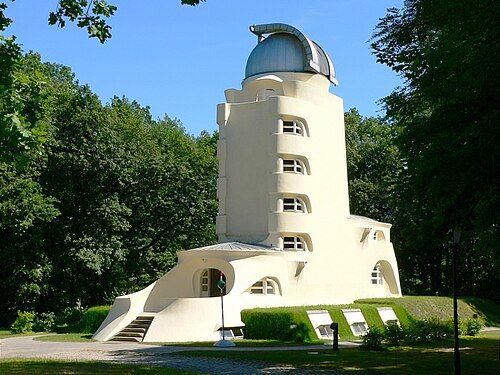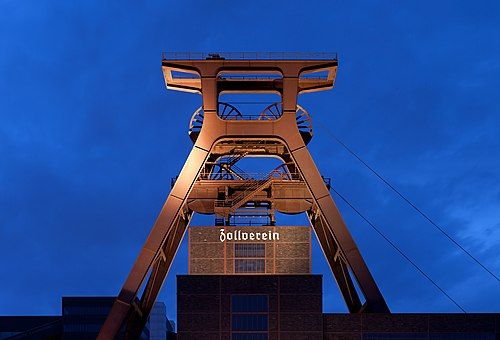Portal:Germany
Welcome to the Germany Portal!
Willkommen im Deutschland-Portal!

|

|
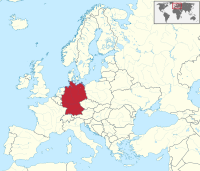
| |
Germany (German: Deutschland), officially the Federal Republic of Germany, is a country in Central and Western Europe, lying between the Baltic and North Sea to the north and the Alps to the south. It borders Denmark to the north, Poland and the Czech Republic to the east, Austria and Switzerland to the south, France to the southwest, and Luxembourg, Belgium and the Netherlands to the west.
Germany includes 16 constituent states, covers an area of 357,578 square kilometres (138,062 sq mi) and has a largely temperate seasonal climate. With nearly 83 million inhabitants, it is the second most populous state of Europe after Russia, the most populous state lying entirely in Europe, as well as the most populous member state of the European Union. Germany is a very decentralized country. Its capital and largest metropolis is Berlin, while Frankfurt serves as its financial capital and has the country's busiest airport.
In 1871, Germany became a nation-state when most of the German states unified into the Prussian-dominated German Empire. After World War I and the Revolution of 1918–19, the empire was replaced by the parliamentary Weimar Republic. The Nazi seizure of power in 1933 led to World War II, and the Holocaust. After the end of World War II in Europe and a period of Allied occupation, two new German states were founded: West Germany, formed from the American, British, and French occupation zones, and East Germany, formed from the western part of the Soviet occupation zone, reduced by the newly established Oder-Neisse line. Following the Revolutions of 1989 that ended communist rule in Central and Eastern Europe, the country was reunified on 3 October 1990.
Today, Germany is a federal parliamentary republic led by a chancellor. It is a great power with a strong economy. The Federal Republic of Germany was a founding member of the European Economic Community in 1957 and the European Union in 1993. Read more...
Selected article
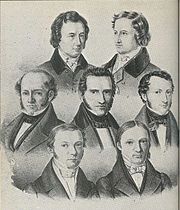
The Göttingen Seven (German: Göttinger Sieben) were a group of seven liberal professors at University of Göttingen. In 1837, they protested against the annulment of the constitution of the Kingdom of Hanover by its new ruler, King Ernest Augustus, and refused to swear an oath to the king. The company of seven was led by historian Friedrich Christoph Dahlmann, who himself was one of the key advocates of the previous constitution. The other six were the Germanist brothers Wilhelm and Jacob Grimm, famed collectors and publishers of folklore, known collectively as the Brothers Grimm, jurist Wilhelm Eduard Albrecht, historian Georg Gottfried Gervinus, physicist Wilhelm Eduard Weber, and theologian and orientalist Heinrich Georg August Ewald. (Full article...)
Selected picture
Related portals
- Parent portals
- Regional
- History
 Holy Roman Empire (900–1806)
Holy Roman Empire (900–1806) East Germany (1949–1990)
East Germany (1949–1990)
- Neighbouring countries
Anniversaries for January 8
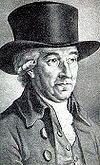
- 1557 – Death of Albert Alcibiades, Margrave of Brandenburg-Kulmbach
- 1632 – Birth of jurist and historian Samuel von Pufendorf
- 1794 – Death of jurist and social theorist Justus Möser
- 1891 – Birth of physicist Walther Bothe, winner of the 1954 Nobel Prize in Physics
- 1904 – Birth of Karl Brandt, personal physician of Adolf Hitler
Did you know...
- ... that the main cemetery of Mainz was established in 1803 and became the model for the Cimetière du Père-Lachaise in Paris?
- ... that while Schubert wrote a melody for the song "Bunt sind schon die Wälder" in 1816, Johann Friedrich Reichardt's 1799 version is the one that remains popular?
- ... that on 26 December 1724 J. S. Bach directed the first performance of Christum wir sollen loben schon, BWV 121, based on a hymn written by Martin Luther in 1524?
- ... that German-born physician Pablo Busch (pictured) was labelled a "witch or curandero" by indigenous tribes in Bolivia?
- ... that Perplexities after Escher, a composition for heckelphone, string quartet and double bass, is based on five graphic artworks by M. C. Escher?
- ... that in addition to millions murdered, Nazi crimes against children included compulsory sterilization, forced labor, forced institutionalization, medical experiments and Germanisation?
- ... that Marie Marcks sarcastically caricatured gender roles like no one before, according to Jutta Limbach?
- ... that Johann Friedrich Hartknoch published the first edition of Immanuel Kant's Critique of Pure Reason?
Selected cuisines, dishes and foods

Topics
Categories
Things you can do

A list of articles needing cleanup associated with this project is available. See also the tool's wiki page and the index of WikiProjects.
Here are some tasks you can do. Please remove completed tasks from the list.
- Requests: German Archaeological Institute at Rome, Deutsche Familienversicherung, Dietlof von Arnim-Boitzenburg, Rolf von Bargen, Hennes Bender, Eduard Georg von Bethusy-Huc, Rolf Brandt (1886–1953), Jan Philipp Burgard, Lisa Feller, Georg Arbogast von und zu Franckenstein, Georg Gafron, Ferdinand Heribert von Galen, Gundula Gause, Karl-Heinz Hagen, Herbert Helmrich, Nils von der Heyde, Monty Jacobs (1875–1945), Hans Katzer, Siegfried Kauder, Matze Knop, Wolfgang Kryszohn, Claus Larass, Isidor Levy (1852–1929), Markus Löning, Tobias Mann, Mathias Müller von Blumencron ,Günther Nonnenmacher Anke Plättner, Hans Heinrich X. Fürst von Pless, Gerd Poppe, Victor-Emanuel Preusker, Günter Prinz, Ulrich Reitz, Hans Sauer (inventor), Franz August Schenk von Stauffenberg, Paul Schlesinger (1878-1928),Oscar Schneider, Hajo Schumacher, Otto Theodor von Seydewitz, Christoph Sieber (comedian), Dorothea Siems, Werner Sonne, Udo zu Stolberg-Wernigerode, Christoph Strässer, Joseph von Utzschneider, Jürgen Wieshoff, Hans Wilhelmi, Dietmar Wischmeyer, Alexandra Würzbach
- Unreferenced: Unreferenced BLPs, Bundesautobahn 93, Benjamin Trinks, Steeler (German band), Amelie Beese, Zoologisches Museum in Kiel, Emil Krebs, Prussian semaphore system, Partenstein, Peter Krieg, Porsche 597, Christa Bauch, Curt Cress, Stefan Beuse
- Cleanup: 53541 issues in total as of 2024-03-03
- Translate: Articles needing translation from German Wikipedia
- Stubs: Albersdorf, Thuringia, Ingo Friedrich, Berndt Seite, Federal Social Court; 117 articles in Category:German MEP stubs
- Update: Deutsches Wörterbuch
- Portal maintenance: Update News, Did you know, announcements and the todo list
- Orphans:
Orphaned articles in Germany

- Photo: Take/Add requested photographs
- Help assess the quality of 924 unassessed articles
Associated Wikimedia
The following Wikimedia Foundation sister projects provide more on this subject:
-
Commons
Free media repository -
Wikibooks
Free textbooks and manuals -
Wikidata
Free knowledge base -
Wikinews
Free-content news -
Wikiquote
Collection of quotations -
Wikisource
Free-content library -
Wikiversity
Free learning tools -
Wikivoyage
Free travel guide -
Wiktionary
Dictionary and thesaurus




















